An Analysis of the Crisis and Recommendations for British Steel
VerifiedAdded on 2020/02/05
|10
|3642
|49
Report
AI Summary
This report delves into the crisis facing the British steel industry, examining its historical background, key macroeconomic factors, and the application of relevant trade theories, particularly the Ricardian Model. It analyzes the role of the government in addressing the crisis, considering factors like the strength of the pound, high electricity prices, and competition from China. The report critically evaluates the effectiveness of government policies such as protectionism. Finally, it provides recommendations for British steel manufacturers, including strategies to lower costs, improve competitiveness, and address the challenges of unfair trade practices. The analysis considers the impact of the crisis on the UK economy and suggests steps to mitigate its effects, focusing on sustainable solutions and policy changes to revitalize the industry. This comprehensive analysis is available on Desklib, a platform offering valuable resources for students.
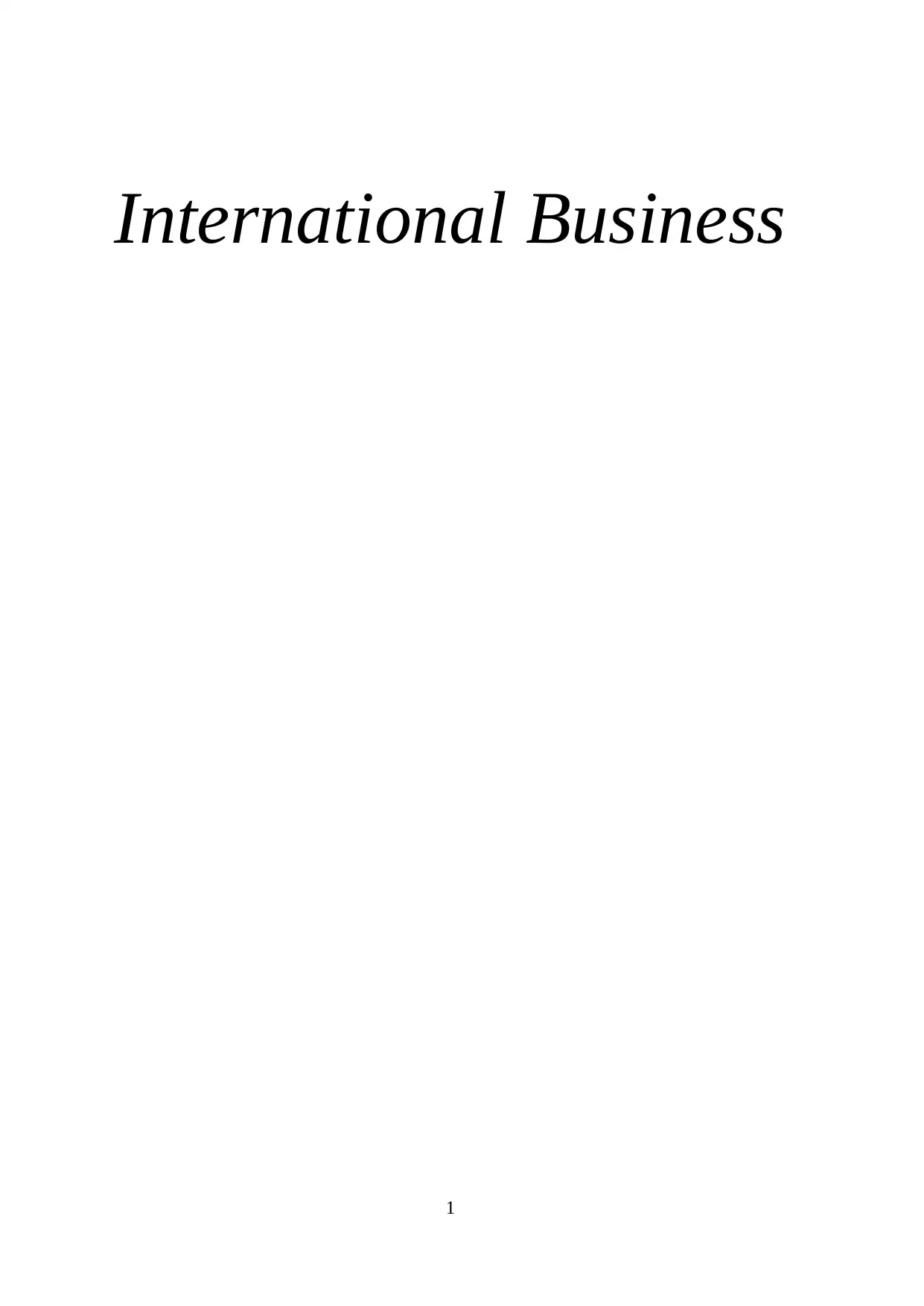
International Business
1
1
Paraphrase This Document
Need a fresh take? Get an instant paraphrase of this document with our AI Paraphraser
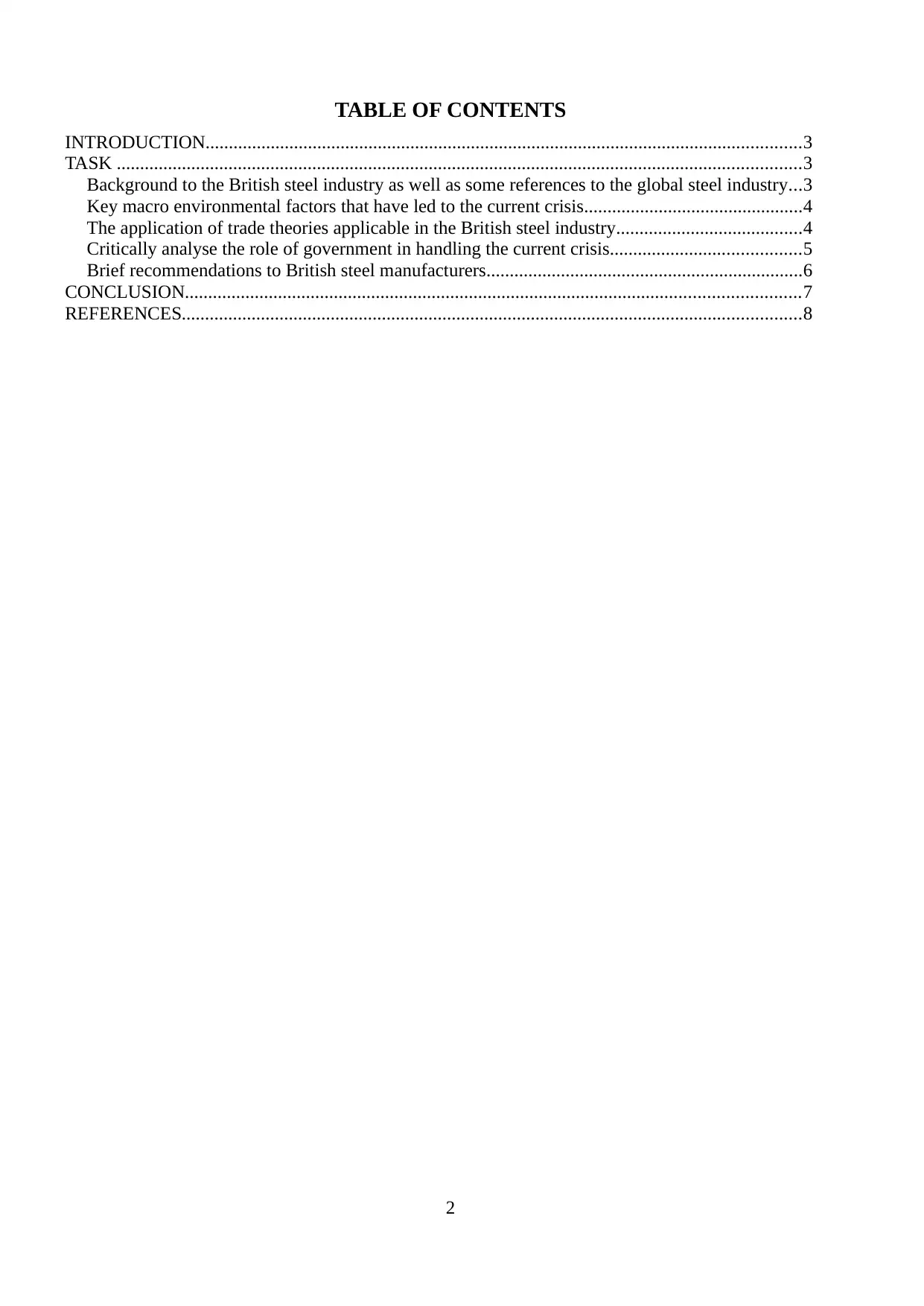
TABLE OF CONTENTS
INTRODUCTION................................................................................................................................3
TASK ...................................................................................................................................................3
Background to the British steel industry as well as some references to the global steel industry...3
Key macro environmental factors that have led to the current crisis...............................................4
The application of trade theories applicable in the British steel industry........................................4
Critically analyse the role of government in handling the current crisis.........................................5
Brief recommendations to British steel manufacturers....................................................................6
CONCLUSION....................................................................................................................................7
REFERENCES.....................................................................................................................................8
2
INTRODUCTION................................................................................................................................3
TASK ...................................................................................................................................................3
Background to the British steel industry as well as some references to the global steel industry...3
Key macro environmental factors that have led to the current crisis...............................................4
The application of trade theories applicable in the British steel industry........................................4
Critically analyse the role of government in handling the current crisis.........................................5
Brief recommendations to British steel manufacturers....................................................................6
CONCLUSION....................................................................................................................................7
REFERENCES.....................................................................................................................................8
2
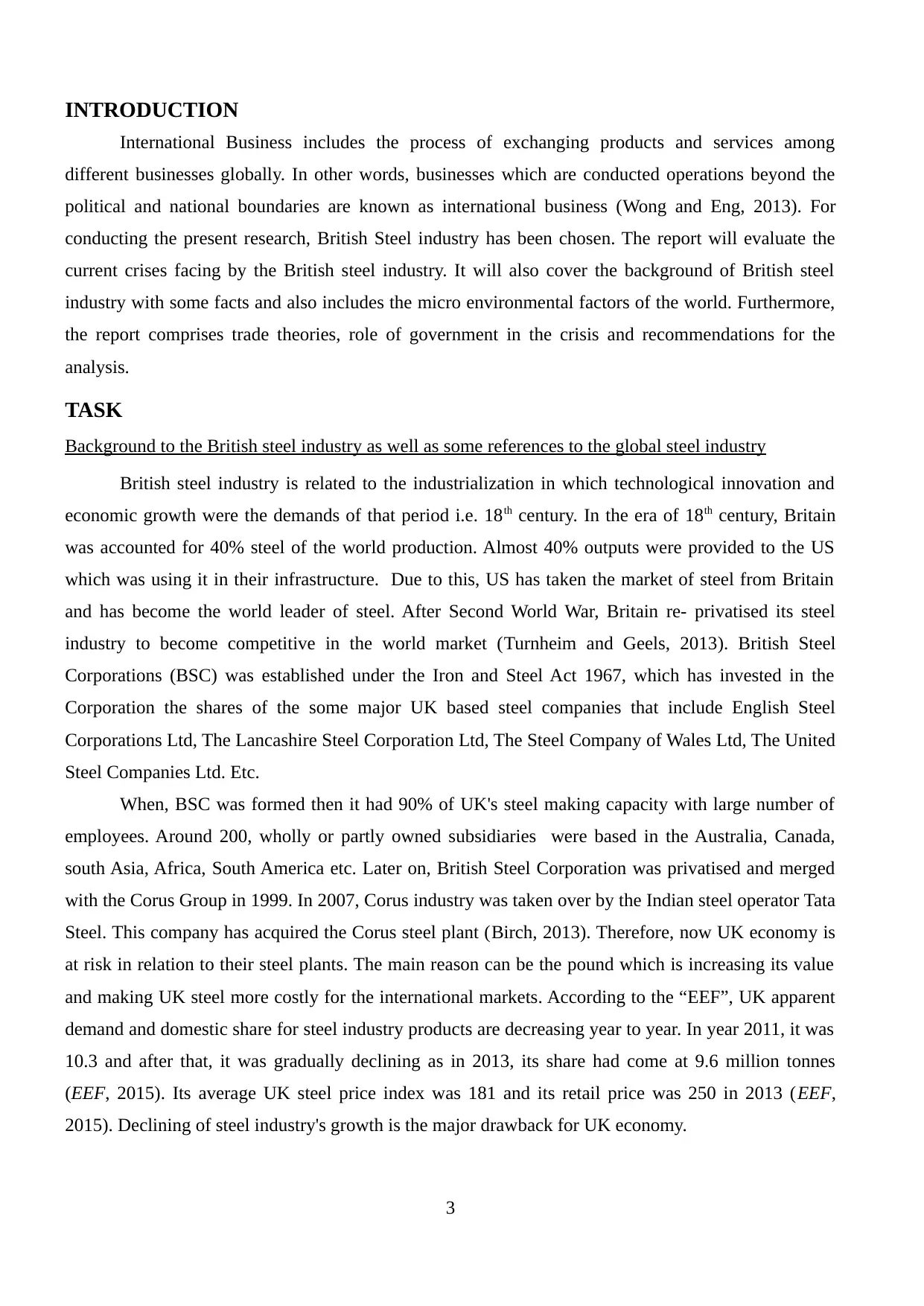
INTRODUCTION
International Business includes the process of exchanging products and services among
different businesses globally. In other words, businesses which are conducted operations beyond the
political and national boundaries are known as international business (Wong and Eng, 2013). For
conducting the present research, British Steel industry has been chosen. The report will evaluate the
current crises facing by the British steel industry. It will also cover the background of British steel
industry with some facts and also includes the micro environmental factors of the world. Furthermore,
the report comprises trade theories, role of government in the crisis and recommendations for the
analysis.
TASK
Background to the British steel industry as well as some references to the global steel industry
British steel industry is related to the industrialization in which technological innovation and
economic growth were the demands of that period i.e. 18th century. In the era of 18th century, Britain
was accounted for 40% steel of the world production. Almost 40% outputs were provided to the US
which was using it in their infrastructure. Due to this, US has taken the market of steel from Britain
and has become the world leader of steel. After Second World War, Britain re- privatised its steel
industry to become competitive in the world market (Turnheim and Geels, 2013). British Steel
Corporations (BSC) was established under the Iron and Steel Act 1967, which has invested in the
Corporation the shares of the some major UK based steel companies that include English Steel
Corporations Ltd, The Lancashire Steel Corporation Ltd, The Steel Company of Wales Ltd, The United
Steel Companies Ltd. Etc.
When, BSC was formed then it had 90% of UK's steel making capacity with large number of
employees. Around 200, wholly or partly owned subsidiaries were based in the Australia, Canada,
south Asia, Africa, South America etc. Later on, British Steel Corporation was privatised and merged
with the Corus Group in 1999. In 2007, Corus industry was taken over by the Indian steel operator Tata
Steel. This company has acquired the Corus steel plant (Birch, 2013). Therefore, now UK economy is
at risk in relation to their steel plants. The main reason can be the pound which is increasing its value
and making UK steel more costly for the international markets. According to the “EEF”, UK apparent
demand and domestic share for steel industry products are decreasing year to year. In year 2011, it was
10.3 and after that, it was gradually declining as in 2013, its share had come at 9.6 million tonnes
(EEF, 2015). Its average UK steel price index was 181 and its retail price was 250 in 2013 (EEF,
2015). Declining of steel industry's growth is the major drawback for UK economy.
3
International Business includes the process of exchanging products and services among
different businesses globally. In other words, businesses which are conducted operations beyond the
political and national boundaries are known as international business (Wong and Eng, 2013). For
conducting the present research, British Steel industry has been chosen. The report will evaluate the
current crises facing by the British steel industry. It will also cover the background of British steel
industry with some facts and also includes the micro environmental factors of the world. Furthermore,
the report comprises trade theories, role of government in the crisis and recommendations for the
analysis.
TASK
Background to the British steel industry as well as some references to the global steel industry
British steel industry is related to the industrialization in which technological innovation and
economic growth were the demands of that period i.e. 18th century. In the era of 18th century, Britain
was accounted for 40% steel of the world production. Almost 40% outputs were provided to the US
which was using it in their infrastructure. Due to this, US has taken the market of steel from Britain
and has become the world leader of steel. After Second World War, Britain re- privatised its steel
industry to become competitive in the world market (Turnheim and Geels, 2013). British Steel
Corporations (BSC) was established under the Iron and Steel Act 1967, which has invested in the
Corporation the shares of the some major UK based steel companies that include English Steel
Corporations Ltd, The Lancashire Steel Corporation Ltd, The Steel Company of Wales Ltd, The United
Steel Companies Ltd. Etc.
When, BSC was formed then it had 90% of UK's steel making capacity with large number of
employees. Around 200, wholly or partly owned subsidiaries were based in the Australia, Canada,
south Asia, Africa, South America etc. Later on, British Steel Corporation was privatised and merged
with the Corus Group in 1999. In 2007, Corus industry was taken over by the Indian steel operator Tata
Steel. This company has acquired the Corus steel plant (Birch, 2013). Therefore, now UK economy is
at risk in relation to their steel plants. The main reason can be the pound which is increasing its value
and making UK steel more costly for the international markets. According to the “EEF”, UK apparent
demand and domestic share for steel industry products are decreasing year to year. In year 2011, it was
10.3 and after that, it was gradually declining as in 2013, its share had come at 9.6 million tonnes
(EEF, 2015). Its average UK steel price index was 181 and its retail price was 250 in 2013 (EEF,
2015). Declining of steel industry's growth is the major drawback for UK economy.
3
⊘ This is a preview!⊘
Do you want full access?
Subscribe today to unlock all pages.

Trusted by 1+ million students worldwide
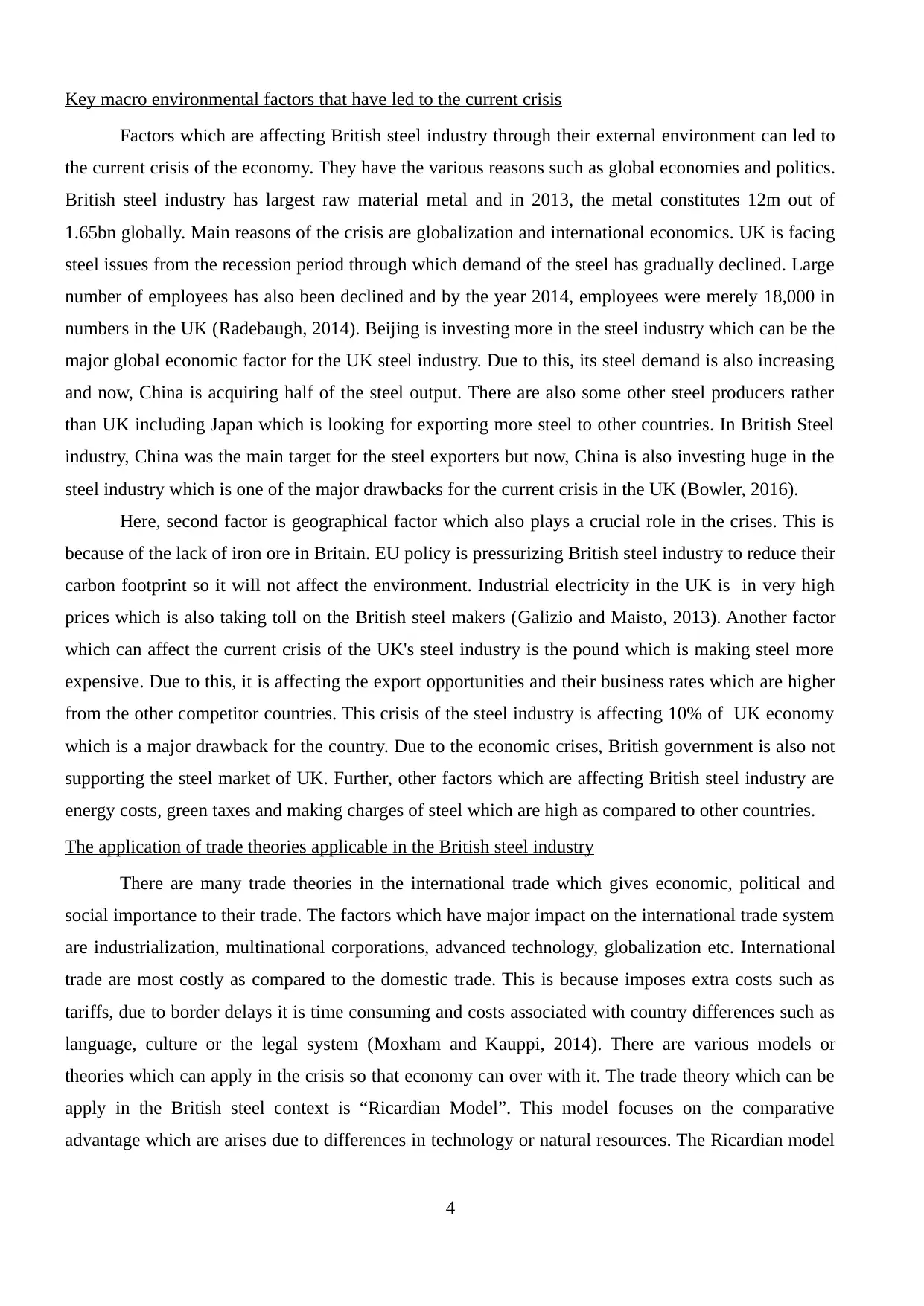
Key macro environmental factors that have led to the current crisis
Factors which are affecting British steel industry through their external environment can led to
the current crisis of the economy. They have the various reasons such as global economies and politics.
British steel industry has largest raw material metal and in 2013, the metal constitutes 12m out of
1.65bn globally. Main reasons of the crisis are globalization and international economics. UK is facing
steel issues from the recession period through which demand of the steel has gradually declined. Large
number of employees has also been declined and by the year 2014, employees were merely 18,000 in
numbers in the UK (Radebaugh, 2014). Beijing is investing more in the steel industry which can be the
major global economic factor for the UK steel industry. Due to this, its steel demand is also increasing
and now, China is acquiring half of the steel output. There are also some other steel producers rather
than UK including Japan which is looking for exporting more steel to other countries. In British Steel
industry, China was the main target for the steel exporters but now, China is also investing huge in the
steel industry which is one of the major drawbacks for the current crisis in the UK (Bowler, 2016).
Here, second factor is geographical factor which also plays a crucial role in the crises. This is
because of the lack of iron ore in Britain. EU policy is pressurizing British steel industry to reduce their
carbon footprint so it will not affect the environment. Industrial electricity in the UK is in very high
prices which is also taking toll on the British steel makers (Galizio and Maisto, 2013). Another factor
which can affect the current crisis of the UK's steel industry is the pound which is making steel more
expensive. Due to this, it is affecting the export opportunities and their business rates which are higher
from the other competitor countries. This crisis of the steel industry is affecting 10% of UK economy
which is a major drawback for the country. Due to the economic crises, British government is also not
supporting the steel market of UK. Further, other factors which are affecting British steel industry are
energy costs, green taxes and making charges of steel which are high as compared to other countries.
The application of trade theories applicable in the British steel industry
There are many trade theories in the international trade which gives economic, political and
social importance to their trade. The factors which have major impact on the international trade system
are industrialization, multinational corporations, advanced technology, globalization etc. International
trade are most costly as compared to the domestic trade. This is because imposes extra costs such as
tariffs, due to border delays it is time consuming and costs associated with country differences such as
language, culture or the legal system (Moxham and Kauppi, 2014). There are various models or
theories which can apply in the crisis so that economy can over with it. The trade theory which can be
apply in the British steel context is “Ricardian Model”. This model focuses on the comparative
advantage which are arises due to differences in technology or natural resources. The Ricardian model
4
Factors which are affecting British steel industry through their external environment can led to
the current crisis of the economy. They have the various reasons such as global economies and politics.
British steel industry has largest raw material metal and in 2013, the metal constitutes 12m out of
1.65bn globally. Main reasons of the crisis are globalization and international economics. UK is facing
steel issues from the recession period through which demand of the steel has gradually declined. Large
number of employees has also been declined and by the year 2014, employees were merely 18,000 in
numbers in the UK (Radebaugh, 2014). Beijing is investing more in the steel industry which can be the
major global economic factor for the UK steel industry. Due to this, its steel demand is also increasing
and now, China is acquiring half of the steel output. There are also some other steel producers rather
than UK including Japan which is looking for exporting more steel to other countries. In British Steel
industry, China was the main target for the steel exporters but now, China is also investing huge in the
steel industry which is one of the major drawbacks for the current crisis in the UK (Bowler, 2016).
Here, second factor is geographical factor which also plays a crucial role in the crises. This is
because of the lack of iron ore in Britain. EU policy is pressurizing British steel industry to reduce their
carbon footprint so it will not affect the environment. Industrial electricity in the UK is in very high
prices which is also taking toll on the British steel makers (Galizio and Maisto, 2013). Another factor
which can affect the current crisis of the UK's steel industry is the pound which is making steel more
expensive. Due to this, it is affecting the export opportunities and their business rates which are higher
from the other competitor countries. This crisis of the steel industry is affecting 10% of UK economy
which is a major drawback for the country. Due to the economic crises, British government is also not
supporting the steel market of UK. Further, other factors which are affecting British steel industry are
energy costs, green taxes and making charges of steel which are high as compared to other countries.
The application of trade theories applicable in the British steel industry
There are many trade theories in the international trade which gives economic, political and
social importance to their trade. The factors which have major impact on the international trade system
are industrialization, multinational corporations, advanced technology, globalization etc. International
trade are most costly as compared to the domestic trade. This is because imposes extra costs such as
tariffs, due to border delays it is time consuming and costs associated with country differences such as
language, culture or the legal system (Moxham and Kauppi, 2014). There are various models or
theories which can apply in the crisis so that economy can over with it. The trade theory which can be
apply in the British steel context is “Ricardian Model”. This model focuses on the comparative
advantage which are arises due to differences in technology or natural resources. The Ricardian model
4
Paraphrase This Document
Need a fresh take? Get an instant paraphrase of this document with our AI Paraphraser
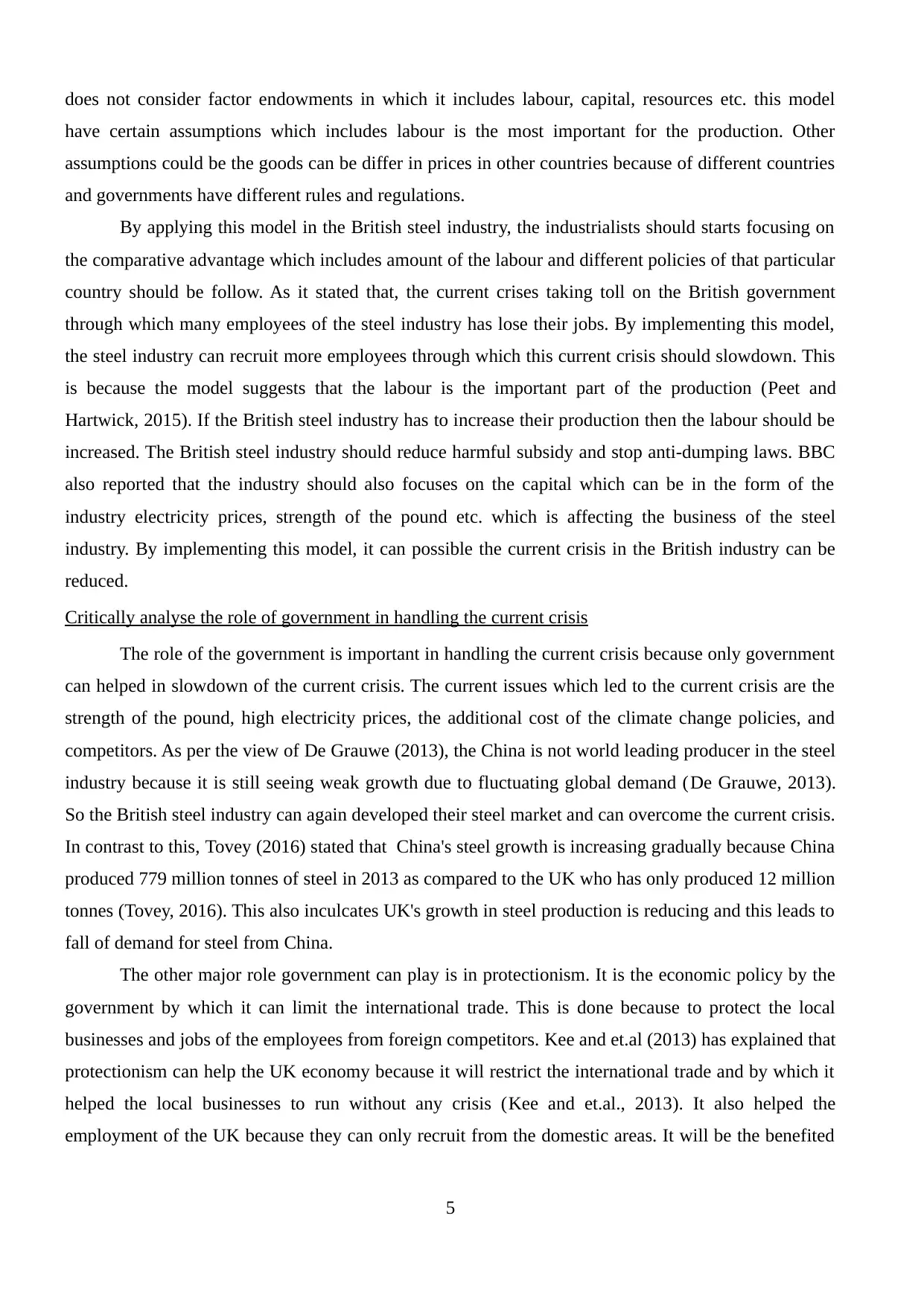
does not consider factor endowments in which it includes labour, capital, resources etc. this model
have certain assumptions which includes labour is the most important for the production. Other
assumptions could be the goods can be differ in prices in other countries because of different countries
and governments have different rules and regulations.
By applying this model in the British steel industry, the industrialists should starts focusing on
the comparative advantage which includes amount of the labour and different policies of that particular
country should be follow. As it stated that, the current crises taking toll on the British government
through which many employees of the steel industry has lose their jobs. By implementing this model,
the steel industry can recruit more employees through which this current crisis should slowdown. This
is because the model suggests that the labour is the important part of the production (Peet and
Hartwick, 2015). If the British steel industry has to increase their production then the labour should be
increased. The British steel industry should reduce harmful subsidy and stop anti-dumping laws. BBC
also reported that the industry should also focuses on the capital which can be in the form of the
industry electricity prices, strength of the pound etc. which is affecting the business of the steel
industry. By implementing this model, it can possible the current crisis in the British industry can be
reduced.
Critically analyse the role of government in handling the current crisis
The role of the government is important in handling the current crisis because only government
can helped in slowdown of the current crisis. The current issues which led to the current crisis are the
strength of the pound, high electricity prices, the additional cost of the climate change policies, and
competitors. As per the view of De Grauwe (2013), the China is not world leading producer in the steel
industry because it is still seeing weak growth due to fluctuating global demand (De Grauwe, 2013).
So the British steel industry can again developed their steel market and can overcome the current crisis.
In contrast to this, Tovey (2016) stated that China's steel growth is increasing gradually because China
produced 779 million tonnes of steel in 2013 as compared to the UK who has only produced 12 million
tonnes (Tovey, 2016). This also inculcates UK's growth in steel production is reducing and this leads to
fall of demand for steel from China.
The other major role government can play is in protectionism. It is the economic policy by the
government by which it can limit the international trade. This is done because to protect the local
businesses and jobs of the employees from foreign competitors. Kee and et.al (2013) has explained that
protectionism can help the UK economy because it will restrict the international trade and by which it
helped the local businesses to run without any crisis (Kee and et.al., 2013). It also helped the
employment of the UK because they can only recruit from the domestic areas. It will be the benefited
5
have certain assumptions which includes labour is the most important for the production. Other
assumptions could be the goods can be differ in prices in other countries because of different countries
and governments have different rules and regulations.
By applying this model in the British steel industry, the industrialists should starts focusing on
the comparative advantage which includes amount of the labour and different policies of that particular
country should be follow. As it stated that, the current crises taking toll on the British government
through which many employees of the steel industry has lose their jobs. By implementing this model,
the steel industry can recruit more employees through which this current crisis should slowdown. This
is because the model suggests that the labour is the important part of the production (Peet and
Hartwick, 2015). If the British steel industry has to increase their production then the labour should be
increased. The British steel industry should reduce harmful subsidy and stop anti-dumping laws. BBC
also reported that the industry should also focuses on the capital which can be in the form of the
industry electricity prices, strength of the pound etc. which is affecting the business of the steel
industry. By implementing this model, it can possible the current crisis in the British industry can be
reduced.
Critically analyse the role of government in handling the current crisis
The role of the government is important in handling the current crisis because only government
can helped in slowdown of the current crisis. The current issues which led to the current crisis are the
strength of the pound, high electricity prices, the additional cost of the climate change policies, and
competitors. As per the view of De Grauwe (2013), the China is not world leading producer in the steel
industry because it is still seeing weak growth due to fluctuating global demand (De Grauwe, 2013).
So the British steel industry can again developed their steel market and can overcome the current crisis.
In contrast to this, Tovey (2016) stated that China's steel growth is increasing gradually because China
produced 779 million tonnes of steel in 2013 as compared to the UK who has only produced 12 million
tonnes (Tovey, 2016). This also inculcates UK's growth in steel production is reducing and this leads to
fall of demand for steel from China.
The other major role government can play is in protectionism. It is the economic policy by the
government by which it can limit the international trade. This is done because to protect the local
businesses and jobs of the employees from foreign competitors. Kee and et.al (2013) has explained that
protectionism can help the UK economy because it will restrict the international trade and by which it
helped the local businesses to run without any crisis (Kee and et.al., 2013). It also helped the
employment of the UK because they can only recruit from the domestic areas. It will be the benefited
5
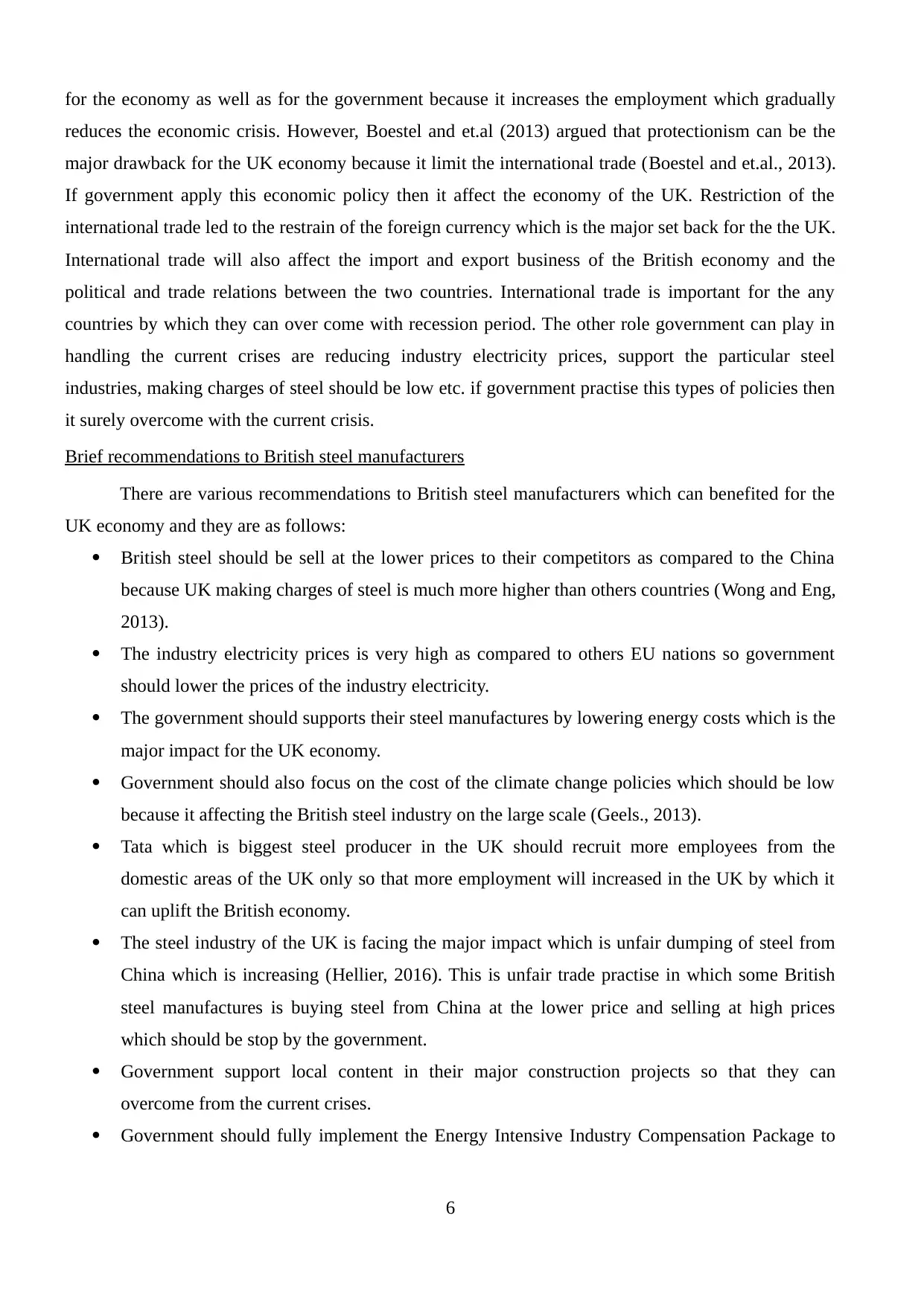
for the economy as well as for the government because it increases the employment which gradually
reduces the economic crisis. However, Boestel and et.al (2013) argued that protectionism can be the
major drawback for the UK economy because it limit the international trade (Boestel and et.al., 2013).
If government apply this economic policy then it affect the economy of the UK. Restriction of the
international trade led to the restrain of the foreign currency which is the major set back for the the UK.
International trade will also affect the import and export business of the British economy and the
political and trade relations between the two countries. International trade is important for the any
countries by which they can over come with recession period. The other role government can play in
handling the current crises are reducing industry electricity prices, support the particular steel
industries, making charges of steel should be low etc. if government practise this types of policies then
it surely overcome with the current crisis.
Brief recommendations to British steel manufacturers
There are various recommendations to British steel manufacturers which can benefited for the
UK economy and they are as follows:
British steel should be sell at the lower prices to their competitors as compared to the China
because UK making charges of steel is much more higher than others countries (Wong and Eng,
2013).
The industry electricity prices is very high as compared to others EU nations so government
should lower the prices of the industry electricity.
The government should supports their steel manufactures by lowering energy costs which is the
major impact for the UK economy.
Government should also focus on the cost of the climate change policies which should be low
because it affecting the British steel industry on the large scale (Geels., 2013).
Tata which is biggest steel producer in the UK should recruit more employees from the
domestic areas of the UK only so that more employment will increased in the UK by which it
can uplift the British economy.
The steel industry of the UK is facing the major impact which is unfair dumping of steel from
China which is increasing (Hellier, 2016). This is unfair trade practise in which some British
steel manufactures is buying steel from China at the lower price and selling at high prices
which should be stop by the government.
Government support local content in their major construction projects so that they can
overcome from the current crises.
Government should fully implement the Energy Intensive Industry Compensation Package to
6
reduces the economic crisis. However, Boestel and et.al (2013) argued that protectionism can be the
major drawback for the UK economy because it limit the international trade (Boestel and et.al., 2013).
If government apply this economic policy then it affect the economy of the UK. Restriction of the
international trade led to the restrain of the foreign currency which is the major set back for the the UK.
International trade will also affect the import and export business of the British economy and the
political and trade relations between the two countries. International trade is important for the any
countries by which they can over come with recession period. The other role government can play in
handling the current crises are reducing industry electricity prices, support the particular steel
industries, making charges of steel should be low etc. if government practise this types of policies then
it surely overcome with the current crisis.
Brief recommendations to British steel manufacturers
There are various recommendations to British steel manufacturers which can benefited for the
UK economy and they are as follows:
British steel should be sell at the lower prices to their competitors as compared to the China
because UK making charges of steel is much more higher than others countries (Wong and Eng,
2013).
The industry electricity prices is very high as compared to others EU nations so government
should lower the prices of the industry electricity.
The government should supports their steel manufactures by lowering energy costs which is the
major impact for the UK economy.
Government should also focus on the cost of the climate change policies which should be low
because it affecting the British steel industry on the large scale (Geels., 2013).
Tata which is biggest steel producer in the UK should recruit more employees from the
domestic areas of the UK only so that more employment will increased in the UK by which it
can uplift the British economy.
The steel industry of the UK is facing the major impact which is unfair dumping of steel from
China which is increasing (Hellier, 2016). This is unfair trade practise in which some British
steel manufactures is buying steel from China at the lower price and selling at high prices
which should be stop by the government.
Government support local content in their major construction projects so that they can
overcome from the current crises.
Government should fully implement the Energy Intensive Industry Compensation Package to
6
⊘ This is a preview!⊘
Do you want full access?
Subscribe today to unlock all pages.

Trusted by 1+ million students worldwide
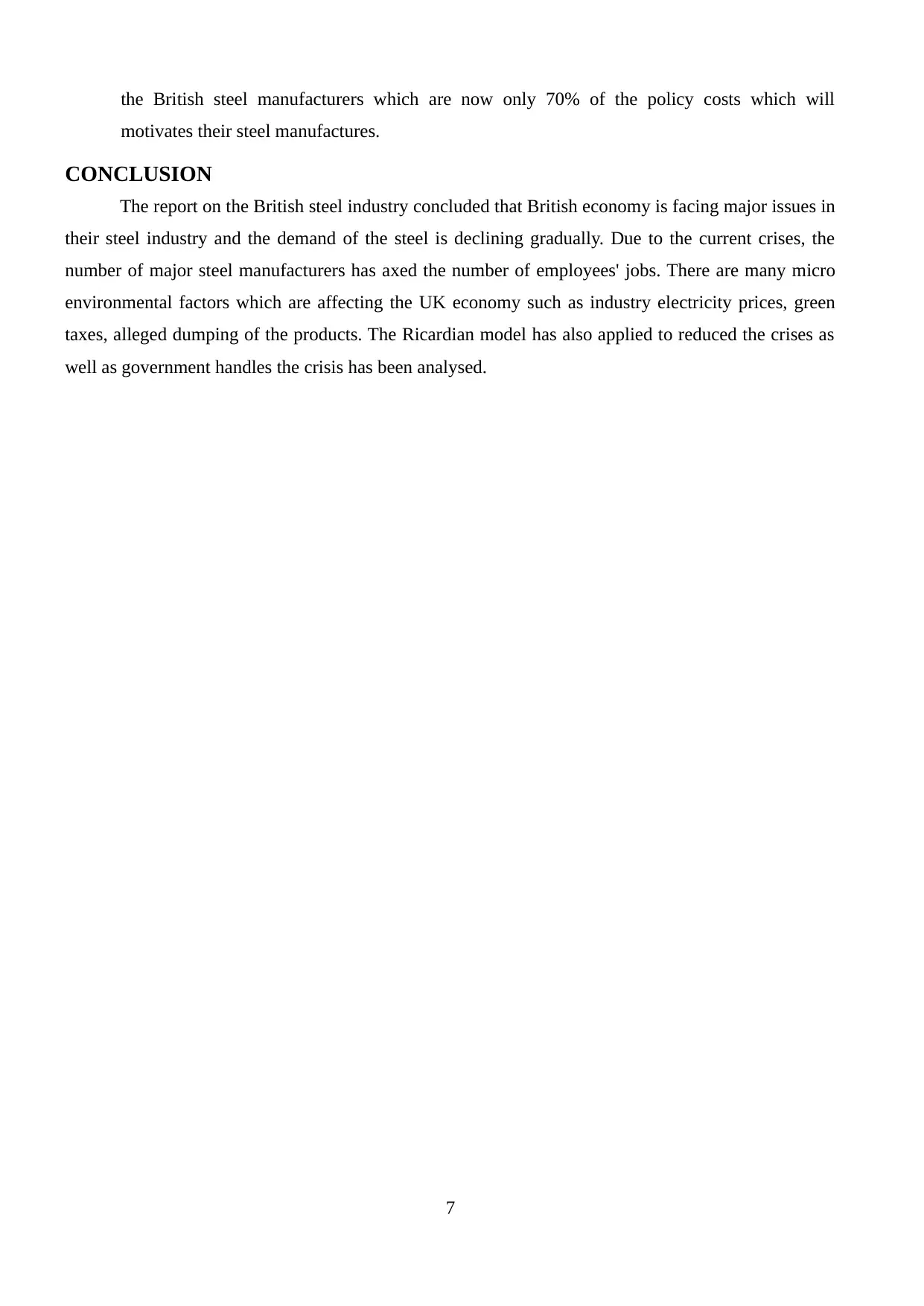
the British steel manufacturers which are now only 70% of the policy costs which will
motivates their steel manufactures.
CONCLUSION
The report on the British steel industry concluded that British economy is facing major issues in
their steel industry and the demand of the steel is declining gradually. Due to the current crises, the
number of major steel manufacturers has axed the number of employees' jobs. There are many micro
environmental factors which are affecting the UK economy such as industry electricity prices, green
taxes, alleged dumping of the products. The Ricardian model has also applied to reduced the crises as
well as government handles the crisis has been analysed.
7
motivates their steel manufactures.
CONCLUSION
The report on the British steel industry concluded that British economy is facing major issues in
their steel industry and the demand of the steel is declining gradually. Due to the current crises, the
number of major steel manufacturers has axed the number of employees' jobs. There are many micro
environmental factors which are affecting the UK economy such as industry electricity prices, green
taxes, alleged dumping of the products. The Ricardian model has also applied to reduced the crises as
well as government handles the crisis has been analysed.
7
Paraphrase This Document
Need a fresh take? Get an instant paraphrase of this document with our AI Paraphraser
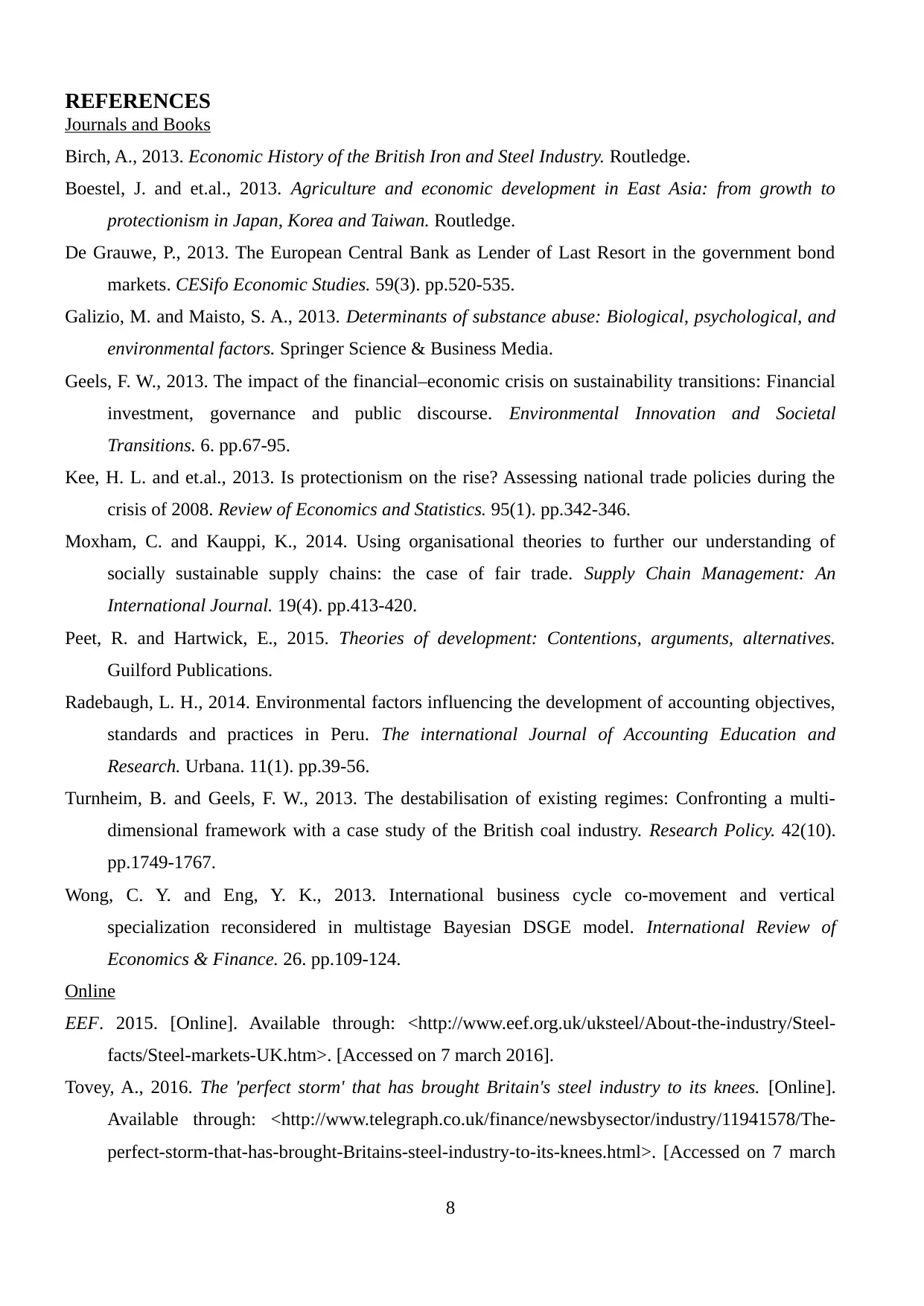
REFERENCES
Journals and Books
Birch, A., 2013. Economic History of the British Iron and Steel Industry. Routledge.
Boestel, J. and et.al., 2013. Agriculture and economic development in East Asia: from growth to
protectionism in Japan, Korea and Taiwan. Routledge.
De Grauwe, P., 2013. The European Central Bank as Lender of Last Resort in the government bond
markets. CESifo Economic Studies. 59(3). pp.520-535.
Galizio, M. and Maisto, S. A., 2013. Determinants of substance abuse: Biological, psychological, and
environmental factors. Springer Science & Business Media.
Geels, F. W., 2013. The impact of the financial–economic crisis on sustainability transitions: Financial
investment, governance and public discourse. Environmental Innovation and Societal
Transitions. 6. pp.67-95.
Kee, H. L. and et.al., 2013. Is protectionism on the rise? Assessing national trade policies during the
crisis of 2008. Review of Economics and Statistics. 95(1). pp.342-346.
Moxham, C. and Kauppi, K., 2014. Using organisational theories to further our understanding of
socially sustainable supply chains: the case of fair trade. Supply Chain Management: An
International Journal. 19(4). pp.413-420.
Peet, R. and Hartwick, E., 2015. Theories of development: Contentions, arguments, alternatives.
Guilford Publications.
Radebaugh, L. H., 2014. Environmental factors influencing the development of accounting objectives,
standards and practices in Peru. The international Journal of Accounting Education and
Research. Urbana. 11(1). pp.39-56.
Turnheim, B. and Geels, F. W., 2013. The destabilisation of existing regimes: Confronting a multi-
dimensional framework with a case study of the British coal industry. Research Policy. 42(10).
pp.1749-1767.
Wong, C. Y. and Eng, Y. K., 2013. International business cycle co-movement and vertical
specialization reconsidered in multistage Bayesian DSGE model. International Review of
Economics & Finance. 26. pp.109-124.
Online
EEF. 2015. [Online]. Available through: <http://www.eef.org.uk/uksteel/About-the-industry/Steel-
facts/Steel-markets-UK.htm>. [Accessed on 7 march 2016].
Tovey, A., 2016. The 'perfect storm' that has brought Britain's steel industry to its knees. [Online].
Available through: <http://www.telegraph.co.uk/finance/newsbysector/industry/11941578/The-
perfect-storm-that-has-brought-Britains-steel-industry-to-its-knees.html>. [Accessed on 7 march
8
Journals and Books
Birch, A., 2013. Economic History of the British Iron and Steel Industry. Routledge.
Boestel, J. and et.al., 2013. Agriculture and economic development in East Asia: from growth to
protectionism in Japan, Korea and Taiwan. Routledge.
De Grauwe, P., 2013. The European Central Bank as Lender of Last Resort in the government bond
markets. CESifo Economic Studies. 59(3). pp.520-535.
Galizio, M. and Maisto, S. A., 2013. Determinants of substance abuse: Biological, psychological, and
environmental factors. Springer Science & Business Media.
Geels, F. W., 2013. The impact of the financial–economic crisis on sustainability transitions: Financial
investment, governance and public discourse. Environmental Innovation and Societal
Transitions. 6. pp.67-95.
Kee, H. L. and et.al., 2013. Is protectionism on the rise? Assessing national trade policies during the
crisis of 2008. Review of Economics and Statistics. 95(1). pp.342-346.
Moxham, C. and Kauppi, K., 2014. Using organisational theories to further our understanding of
socially sustainable supply chains: the case of fair trade. Supply Chain Management: An
International Journal. 19(4). pp.413-420.
Peet, R. and Hartwick, E., 2015. Theories of development: Contentions, arguments, alternatives.
Guilford Publications.
Radebaugh, L. H., 2014. Environmental factors influencing the development of accounting objectives,
standards and practices in Peru. The international Journal of Accounting Education and
Research. Urbana. 11(1). pp.39-56.
Turnheim, B. and Geels, F. W., 2013. The destabilisation of existing regimes: Confronting a multi-
dimensional framework with a case study of the British coal industry. Research Policy. 42(10).
pp.1749-1767.
Wong, C. Y. and Eng, Y. K., 2013. International business cycle co-movement and vertical
specialization reconsidered in multistage Bayesian DSGE model. International Review of
Economics & Finance. 26. pp.109-124.
Online
EEF. 2015. [Online]. Available through: <http://www.eef.org.uk/uksteel/About-the-industry/Steel-
facts/Steel-markets-UK.htm>. [Accessed on 7 march 2016].
Tovey, A., 2016. The 'perfect storm' that has brought Britain's steel industry to its knees. [Online].
Available through: <http://www.telegraph.co.uk/finance/newsbysector/industry/11941578/The-
perfect-storm-that-has-brought-Britains-steel-industry-to-its-knees.html>. [Accessed on 7 march
8
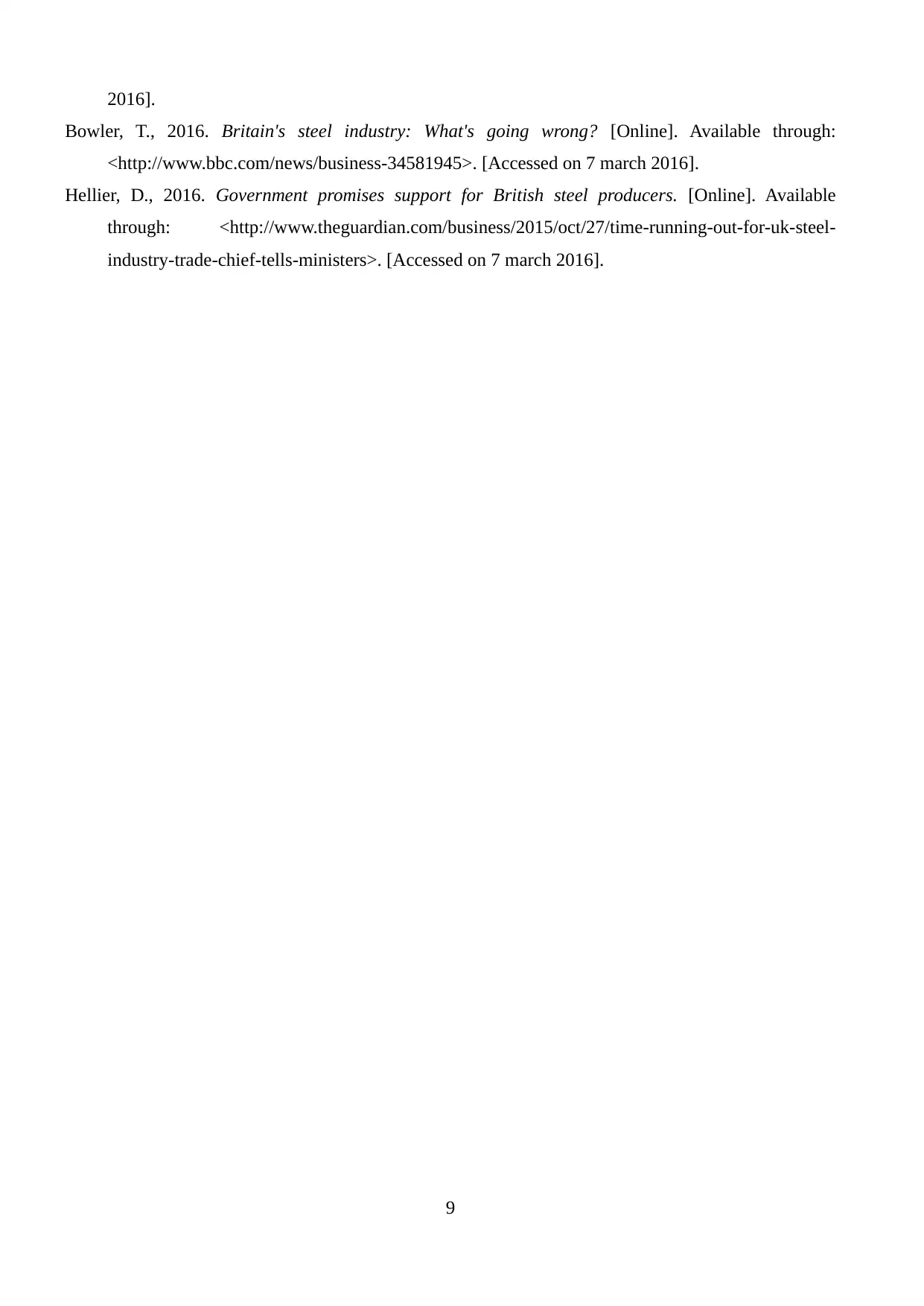
2016].
Bowler, T., 2016. Britain's steel industry: What's going wrong? [Online]. Available through:
<http://www.bbc.com/news/business-34581945>. [Accessed on 7 march 2016].
Hellier, D., 2016. Government promises support for British steel producers. [Online]. Available
through: <http://www.theguardian.com/business/2015/oct/27/time-running-out-for-uk-steel-
industry-trade-chief-tells-ministers>. [Accessed on 7 march 2016].
9
Bowler, T., 2016. Britain's steel industry: What's going wrong? [Online]. Available through:
<http://www.bbc.com/news/business-34581945>. [Accessed on 7 march 2016].
Hellier, D., 2016. Government promises support for British steel producers. [Online]. Available
through: <http://www.theguardian.com/business/2015/oct/27/time-running-out-for-uk-steel-
industry-trade-chief-tells-ministers>. [Accessed on 7 march 2016].
9
⊘ This is a preview!⊘
Do you want full access?
Subscribe today to unlock all pages.

Trusted by 1+ million students worldwide

Page | 10
1 out of 10
Your All-in-One AI-Powered Toolkit for Academic Success.
+13062052269
info@desklib.com
Available 24*7 on WhatsApp / Email
![[object Object]](/_next/static/media/star-bottom.7253800d.svg)
Unlock your academic potential
Copyright © 2020–2026 A2Z Services. All Rights Reserved. Developed and managed by ZUCOL.


